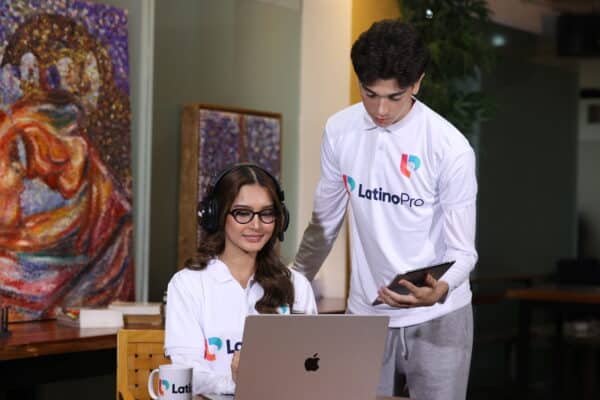How to Build a Rewarding Career
latinopro
on
August 12, 2025

Legal Transcriptionist Work
Legal Transcriptionist Work: How to Build a Rewarding Career
If you’ve ever wondered what it’s like to transform legal proceedings into accurate written records, legal transcriptionist work might be the career for you. This role blends precision, legal knowledge, and strong listening skills to help attorneys and legal teams handle critical documentation as part of a dedicated team. Whether you’re looking for flexibility or a remote career path, the demand for skilled court transcribers and legal transcriptionists continues to grow.
Table of Contents
What Does a Legal Transcriptionist Actually Do?
Legal transcriptionists convert audio and video recordings from court hearings, depositions, and attorney meetings into clear, error-free transcripts. They ensure accuracy while following specific style guides and confidentiality requirements, working closely with a supportive team.
A typical day for transcriptionists can include transcribing spoken word from lawyers, preparing transcripts for legal research, or editing complex legal terminology to ensure clarity. Many transcriptionists do virtual work , often as independent contractors, giving them the flexibility to manage their schedules.
Here’s Our Virtual Legal Assistant That Helps You Handle Legal Tasks with Ease

Why Is Accuracy So Important in Legal Transcription?
Every word in a legal transcript can affect the outcome of a case. That’s why excellent grammar, attention to detail, and fast typing speed are essential abilities.
Accurate legal transcribing helps lawyers build stronger cases, assists court reporters and transcriptionists in recordkeeping, and ensures that legal documents meet high standards. Even a small error in transcribing can lead to misunderstandings during legal or lawsuit proceedings.
What Abilities Do You Need to Succeed as a Legal Transcriptionist?
Successful court transcribers possess excellent listening abilities , strong editing abilities, and a solid grasp of legal terminology. These abilities ensure they can produce accurate legal documents from audio recordings.
You’ll also need to meet confidentiality requirements, manage multiple projects, and maintain a consistent skill level to keep up with deadlines in paid assignments. Prior experience in general transcription or the legal industry can be a valuable advantage.
How Can You Get Legal Transcriptionist Training?
Formal legal transcriptionist training programs and legal transcription training can help you learn legal terminology, improve your typing speed, and refine your editing abilities. Some training also covers legal research and how to handle complex audio.
Many institutions offer online legal transcribing courses, allowing you to learn at your own pace and improve your skill level. Paid internships or paid on-the-job training with lawyers or transcription services can also boost your legal transcriptionist career prospects.
Legal Proceedings: How They Shape Legal Transcription Work
Legal proceedings serve as the foundation for much of the work performed by legal transcriptionists. Every hearing, deposition, or valid meeting produces important audio and video content that must be transformed into precise, paid, word-for-word transcripts. By understanding the nature and flow of these proceedings, court transcribers with excellent listening skills can ensure the exact, clarity, and completeness of each document, helping legal professionals rely on dependable written records.
What Legal Transcribers Do in the Legal Industry
Legal or court transcribers are an essential part of the law sector, responsible for converting spoken legal content into detailed, error-free written transcripts. They work with court hearings, depositions, and confidential client meetings, ensuring that every statement is preserved accurately. Their work supports lawyers, law firms, and court systems in maintaining clear documentation that can be referenced during trials, appeals, or case law research, which is a major responsibility of the job.
From Court Reporter Notes to Legal Transcription Work
Court reporters capture real-time events during lawsuit, but the work does not end there. Legal transcriptionists often take those audio recordings or shorthand notes and refine them into polished, properly formatted transcripts. This process demands excellent listening skills along with a deep understanding of legal terminology, context, and formatting guidelines to ensure that the written version is a true and accurate reflection of the spoken word.
Why General Transcription Abilities Matter in Legal Transcription
Having a background in standard transcription can be a strong advantage when entering the legal transcription field. Skills such as fast and accurate typing, attention to detail, and the ability to handle various audio qualities are all transferable to legal work and help you perform the job well. These foundational skills help aspiring legal transcriptionists adapt quickly to industry-specific demands, including legal vocabulary, procedural accuracy, and confidentiality prerequisites.
Join Our Team of Skilled Legal Transcribers
We are always looking for motivated and detail-oriented professionals to join our growing team of court transcribers. Whether you have prior experience in lawsuit, standard transcription, or court reporting, your editing skills, familiarity with style guides, and other talents can help deliver precise, high-quality legal documents for our clients. Working with us offers the opportunity to handle diverse projects, grow professionally within the law sector, and contribute to maintaining the highest standards of legal documentation.
Can You Work Remotely as a Legal Transcriptionist?
Yes — many legal transcriptionist jobs allow you to work remotely from anywhere. All you need is a reliable computer, a good headset, and transcription software.
Remote legal transcription work is ideal for independent contractors who value flexibility and want a job they can do from anywhere. It also allows skilled legal transcriptionists to serve multiple lawyers and legal firms without location constraints.
This chart shows the growing share of remote positions in the legal transcription field, making it easier to see how this career adapts to modern work trends.
"Legal Transcriptionist Work by Employment Type"
Where Can You Find Legal Transcriptionist Jobs?
Legal transcriptionists can find work through transcription services, law firms, and specialized job boards. Some companies offer project-based work, while others hire full-time or part-time staff.
Websites like Indeed and FlexJobs regularly list transcription work, including positions in the law sector. You can also explore opportunities with dedicated transcription companies that hire trained court transcribers.
How Can You Start Your Legal Transcriptionist Career Today?
If you have strong typing abilities, excellent grammar, and an interest in law, this legal transcription job could be a perfect fit. Start by improving your transcription abilities, learning legal terminology, and gaining practical experience.
You can also join our team of skilled legal transcriptionists to work on a variety of projects, from court hearings to audio and video recordings for lawyers. This is your chance to turn your skills into a rewarding, well-paid career.
Conclusion
A career as a legal transcriptionist offers the perfect blend of flexibility, intellectual challenge, and professional growth. By honing your accuracy, mastering legal terminology, and leveraging available training programs, you can position yourself for long-term success in this in-demand field. Whether you choose to work with law firms, transcription companies, or as an independent contractor, your skills will play a vital role in ensuring legal records are precise and reliable. With dedication and the right resources, you can transform your interest in law and transcription into a rewarding, sustainable career.
Ready to take the next step?
Book now!
Discover more Amazing Blogs
A quiet brilliance unfolds as you step into this blog — like opening a window to a calm, sunlit morning where each idea arrives with purpose and grace. Every article feels like a conversation with a trusted guide, gently helping readers rediscover the art of working smarter, not harder.
Venture further, and you’ll find content tailored to both the seasoned entrepreneur and the rising virtual professional. From legal offices to real estate teams, each post offers insight crafted with experience, care, and a deep understanding of what modern work truly needs.
How Do Document Review Specialists Virtual Assistant Operate in Law Firms?
How Do Document Review Specialists Virtual Assistant Operate In Law Firms How Do Virtual Assistant Document Review Specialists Work Within
Why Virtual Legal Assistants Important In Law Firms
Why Virtual Legal Assistants Important In Law Firms Why Virtual Legal Assistants Important In Law Firms The new legal environment
Executive Administrator vs Executive Assistant: What’s the Real Difference?
Executive Administrator vs Executive Assistant What's the Real Difference? Understanding the roles of an executive administrator vs executive assistant, often
Legal Research Assistant
The Practical Guide for Busy Lawyers, Law Firms, and Virtual Legal Assistants If you’ve Ever Wondered How to Free Up
Administrative Assistant Hard Skills: What Do You Need To Know?
Administrative Assistant Hard Skills Administrative Assistant Hard Skills: What Do You Need To Know? Administrative assistant hard skills, technical abilities,
Legal Assistant Certification: Is It the Correct Move for Your Career?
Legal Assistant Certification Legal Assistant Certification: Is It The Correct Move For Your Career? Legal assistant certification program is a
The Complete Guide to Hiring a Virtual Assistant for Lawyers
Virtual Assistant for Lawyers The Complete Guide to Hiring a Virtual Assistant for Lawyers If you’re interested in the legal
Outsourced Legal Intake: Why a Legal Intake Specialist Matters for Law Firms
Outsourced Legal Intake Outsourced Legal Intake: Why A Legal Intake Specialist Matters For Law Firms The first impression legal matters
Accounting Interview Questions and Answers: How Can You Prepare Effectively?
Accounting Interview Questions And Answers Accounting Interview Questions and Answers: How Can You Prepare Effectively? Starting a career in the
Top Legal Outsourcing Companies
Top Legal Outsourcing Companies: Your Friendly Guide To Smart Legal Support Ever find yourself staring at a mountain of legal
Remote Legal Assistant Jobs
Remote Legal Assistant Jobs: Find, Qualify & Thrive in Law Finding remote legal assistant jobs today is both promising and
Real Doctor’s Note Example
Real Doctors Note Example Authentic Real Doctors Note Example: What You Need to Know Need a real doctors note example?
Why Are Paralegal Assistant Jobs So Critical in Today’s Legal Landscape?
Paralegal Assistant Jobs Why Are Paralegal Assistant Jobs So Critical in Today’s Legal Landscape? IntroductionLooking for insights into paralegal assistant
Blueface Looks: Shocking New Photos from Prison Go Viral
Blueface Looks Shocking New Photos from Prison Go Viral Blueface’s new prison photos reveal a dramatic transformation, shocking fans with
Elon Musk Quotes
Elon Musk Quotes: Inspiration, Meaning, and How to Apply Them in Real Life The tech visionary Elon Musk is known
What Is an Intake Specialist at a Law Firm?
What Is an Intake Specialist at a Law Firm The Unsung Hero of Every Law Firm Picture this: Someone’s had
Virtual Legal Assistant Services: Save Time, Cut Costs, and Scale Your Firm
Virtual Legal Assistant Services Virtual Legal Assistant Services: Save Time, Cut Costs, and Scale Your Firm If evenings and weekends
Legal Assistant vs Legal Secretary: What’s the Real Difference?
Legal Assistant vs Legal Secretary Legal Assistant vs Legal Secretary: What’s the Real Difference? Choosing between a legal assistant vs
Is Legal Assistant Training The Best Way To Begin Your Legal Career?
Legal Assistant Training Is Legal Assistant Training The Best Way To Begin Your Legal Career? The focus key phrase “legal
What Is the Difference Between Transcription and Translation?
Transcription and Translation What Is the Difference Between Transcription and Translation? Many people confuse transcription with translation, especially when they
Care Coordinator vs Case Manager: What’s the Difference?
Care Coordinator vs Case Manager Care Coordinator vs Case Manager: What's the Difference? If you've been wondering how a care
Case Management Software for Government
Case Management Software for Government: Features & Benefits Government solutions that replace paper and spreadsheets with auditable workflows, citizen portals,
How to Become a Legal Transcriptionist: Your Step-by-Step Guide
How To Become A Legal Transcriptionist How to Become a Legal Transcriptionist: Your Step-by-Step Guide If you've ever asked yourself
How to Build a Rewarding Career
Legal Transcriptionist Work Legal Transcriptionist Work: How to Build a Rewarding Career If you’ve ever wondered what it’s like to
Virtual Legal Assistant Benefits
Virtual Legal Assistant Benefits: How VAs Save Time, Cut Costs & Boost Billable Hours If you’re running a law firm
Cristiano Ronaldo Injury Update: Recovery Timeline, Match Outlook & Digital Health Support
Cristiano Ronaldo Injury Update Recovery Timeline, Match Outlook & Digital Health Support Football fans, sports media readers, and healthcare professionals
What Is a Legal Intake Specialist?
What Is a Legal Intake Specialist What Is a Legal Intake Specialist? In the intro, let's define what is a
How Do I Become a Legal Transcriptionist
How Do I Become a Legal Transcriptionist? A Practical Guide If you’re here wondering, “How do I become a legal
Attorney vs Lawyer: Key Differences and How a Virtual Legal Assistant Can Help
Attorney vs Lawyer Key Differences and How a Virtual Legal Assistant Can Help The debate over attorney vs lawyer has
How to say “hi” in Spanish
How to Say Hi in Spanish Essential phrases for greeting people in Spanish Master essential Spanish greetings and learn when
Remote Medical Interpreter Jobs
Remote Medical Interpreter Jobs: Everything You Need to Know Finding remote medical interpreter jobs can feel like navigating a maze—especially
Legal Intake Specialist Job Description: What Does the Work Entail?
Legal Intake Specialist Job Description Legal Intake Specialist Job Description: What Does the Work Entail? If you're searching for an
Paralegal Assistant Salary
Paralegal Assistant Salary in 2025: What You Need to Know Knowing how much a paralegal assistant salary earns in 2025
Top Remote Paralegal Consultation Services for Law Firms
Remote Paralegal Consultation Top Remote Paralegal Consultation Services for Law Firms Are you wondering how remote paralegal consultation can benefit
What Does It Take to Be a Legal Assistant
What Does It Take to Be a Legal Assistant? 7 Key Steps & Skills Becoming a stellar legal assistant or
How Legal Consultation Can Help in Insurance Claims
How Legal Consultation Can Assist In Insurance Claims How Legal Consultation Can Help in Insurance Claims If you ever had
Top 5 Essential Skills for a Legal and Administrative Assistant Career
Legal And Administrative Assistant Top 5 Essential Skills for a Legal and Administrative Assistant Career Thinking of becoming a legal
Virtual Case Manager Jobs: What Should You Know Before Applying?
Virtual Case Manager Jobs Virtual Case Manager Jobs: What Should You Know Before Applying? If you're searching for virtual case
Can a Legal Assistant Become a Lawyer
Can a Legal Assistant Become a Lawyer? Definitive Guide Can a legal assistant become a lawyer? For many paralegal professionals,
How to Become a Legal Assistant: Your Step-by-Step Career Guide
How to Become a Legal Assistant How to Become a Legal Assistant: Your Step-by-Step Career Guide If you're wondering how
What Does Contingent Mean in Real Estate?
What Does Contingent Mean In Real Estate What Does Contingent Mean in Real Estate? A Clear Guide for Buyers and
Accounting Virtual Assistant Salary: Here’s What You Must Know
Accounting Virtual Assistant Salary Accounting Virtual Assistant Salary: Here's What You Must Know In today’s competitive business environment, many US
Operations Assistant Salary in 2025: Career Outlook, Pay Trends & Job Security
Operations Assistant Salary Operations Assistant Salary in 2025: Career Outlook, Pay Trends & Job Security If you're considering a operations
Top Healthcare Outsourcing Companies in the US: Who Leads the Industry Today?
Top Healthcare Outsourcing Companies In The US Top Healthcare Outsourcing Companies in the US: Who Leads the Industry Today? In
What Do Real Estate Virtual Assistants Do?
What Do Real Estate Virtual Assistants Do? What Do Real Estate Virtual Assistants Do? Essential Tasks You Need to Know
What Does a Medical Scribe Do? Understanding the Role in Today’s Healthcare System
What Does a Medical Scribe Do? Understanding the Role in Today’s Healthcare System If you’ve ever asked, what does a
What Does Good Customer Service Mean to You: Expert Guide
What Does Good Customer Service Mean to You What Does Good Customer Service Mean to You: Key Insights Good customer
Executive Assistant Duties
Executive Assistant Duties: The Ultimate 2025 Guide As organizations navigate an increasingly complex business landscape, executive assistants (EAs) with expertise
How to Become a Social Media Manager
How to Become a Social Media Manager How to Become a Social Media Manager in 2025 (Step-by-Step Career Guide) In
What is a Case Manager: A Complete Guide to Their Role and Impact
What is a Case Manager What is a Case Manager: A Complete Guide to Their Role and Impact When life
Marketing Assistant Job Description: The Ultimate Guide
Marketing Assistant Job Description Marketing Assistant Job Description: The Ultimate Guide A well-crafted marketing assistant job description is the foundation
Bilingual Virtual Receptionist: A Smart Move for a Diverse Business Landscape
Bilingual Virtual Receptionist A Smart Move for a Diverse Business Landscape A bilingual virtual receptionist can help your business connect
Appointment Setter vs Sales Representative: What’s the Real Difference?
Appointment Setter vs Sales Representative What’s the Real Difference? In the world of sales, roles can blur. That’s why many
Administrative Virtual Assistant Duties
Administrative Virtual Assistant Duties Administrative Virtual Assistant Duties: The Ultimate Guide In a fast‑paced business landscape, every minute counts. Enter
Virtual Receptionist Jobs
What Are Virtual Receptionist Jobs? A Complete Guide In an era of remote work and on‑demand customer service, virtual receptionist
Legal Assistant Interview Questions
Legal Assistant Interview Questions Legal Assistant Interview Questions: What Should You Expect? Legal assistant interview questions can make or break
Todd Chrisley Prison Sentence
A 2025 Guide to Understanding This Virtual Legal Role When the headline “Todd Chrisley prison sentence” first broke, fans of
Virtual Receptionist Appointment Scheduling
The Complete Guide to Virtual Receptionist Appointment Scheduling In today’s always-on world, missing a single client phone call can mean
Virtual Scribing: Hire a Virtual Scribe for Better Patient Care
Virtual Scribing Hire a Virtual Scribe for Better Patient Care Virtual or digital scribing provides real-time documentation support for healthcare
Executive Assistant Job Description
Executive Assistant Job Description Executive Assistant Responsibilities — 10 Core Duties & How to Master Them “An executive assistant (EA)
Efficient Project Management with Virtual Assistants: 2025 Insights
Efficient Project Management With Virtual Assistants Efficient Project Management with Virtual Assistants: 2025 Insights If you’re juggling multiple deadlines, stakeholder
Master Operation Assistant Work Today Easily
0perations Assistant Work Master Operation Assistant Work Today Easily A Virtual Operations Assistant ensures your business moves forward efficiently by
Jams Launches Peanut Butter and Jelly, Protein Craze
Jams Launches Peanut Butter and Jelly Athlete-backed Jams takes on the peanut butter and jelly market amid the protein craze
Andrea Gibson Dies at 49
The death of Andrea Gibson Celebrated Poet and Performance Artist Leaves a Lasting Legacy Celebrated poet and performance artist Andrea
Virtual Assistant for Lead Generation
Virtual Assistant for Lead Generation How a Virtual Assistant for Lead Generation Elevates Your Sales in 2025 Have you ever
Legal Assistant and Paralegal
Legal Assistant and Paralegal: What You Need to Know Choosing between a legal assistant and paralegal can feel daunting—after all,
What Is a Paralegal
What Is Paralegal? A 2025 Guide to Understanding This Virtual Legal Role Blue-collar work roles, such as paralegals and legal
Virtual Operations Assistant Manager
What Does a Virtual Operations Assistant Manager Really Do in 2025? In today’s remote-first business world, staying organized in your
Virtual Assistant For Accountant
Virtual Assistant For Accountant Virtual Assistant for Accountant: Your 2025 Guide to Growing Smarter, Not Harder If you’re an accountant
How To Become A Paralegal
Want to Work in Law Without Becoming a Lawyer? Here's the Truth About How to Become a Paralegal If you
Todd Chrisley
Todd Chrisley Trump’s Hollywood-Style Pardon: Did Todd Chrisley Buy Freedom With Fame and Politics? When former President Donald Trump pardoned
Todd Chrisley Legal Assistant
Todd Chrisley Legal Assistant Trump’s Chrisley Pardon Sparks Outrage: Is Justice Only for the Famous? The Chrisleys are back in
Todd Chrisley Pardoned or Privileged?
Pardoned or Privileged? The Todd Chrisley Saga Sparks Debate on Justice and Influence In a move that has ignited both
What is a Legal Case Manager
What is a Legal Case Manager What Is a Legal Case Manager? Role, Salary & Hiring Guide 2025 Have you
What Is Legal Assistant
What Is Legal Assistant A Guide for Law Firms and Legal Professionals As the legal industry changes with technology, law
Remote Legal Intake Specialist
Paralegal vs Legal Assistant What’s the Right Legal Career Path for You? If you’re interested in the legal field but
Paralegal vs Legal Assistant
Paralegal vs Legal Assistant What’s the Right Legal Career Path for You? If you’re interested in the legal field but




















































































